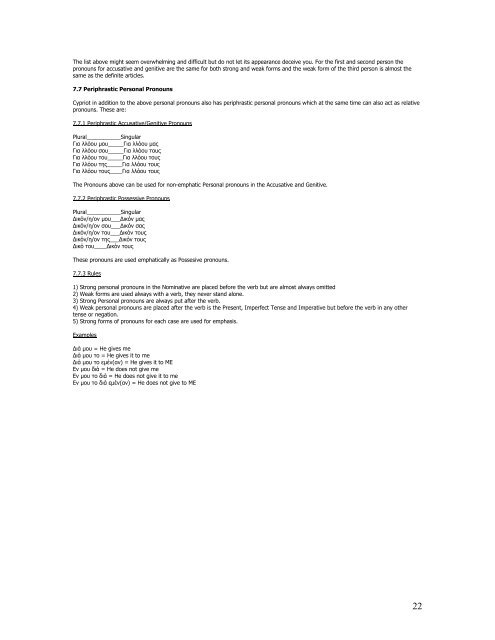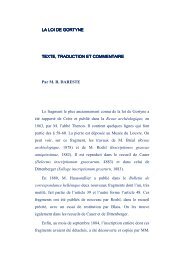CYPRIOT GRAMMAR
CYPRIOT GRAMMAR
CYPRIOT GRAMMAR
You also want an ePaper? Increase the reach of your titles
YUMPU automatically turns print PDFs into web optimized ePapers that Google loves.
Τhe list above might seem overwhelming and difficult but do not let its appearance deceive you. For the first and second person the<br />
pronouns for accusative and genitive are the same for both strong and weak forms and the weak form of the third person is almost the<br />
same as the definite articles.<br />
7.7 Periphrastic Personal Pronouns<br />
Cypriot in addition to the above personal pronouns also has periphrastic personal pronouns which at the same time can also act as relative<br />
pronouns. These are:<br />
7.7.1 Periphrastic Accusative/Genitive Pronouns<br />
Plural___________Singular<br />
Για λλόου μου_____Για λλόου μας<br />
Για λλόου σου_____Για λλόου τους<br />
Για λλόου του_____Για λλόου τους<br />
Για λλόου της_____Για λλόου τους<br />
Για λλόου τους____Για λλόου τους<br />
The Pronouns above can be used for non-emphatic Personal pronouns in the Accusative and Genitive.<br />
7.7.2 Periphrastic Possessive Pronouns<br />
Plural___________Singular<br />
Δικόν/η/ον μου___Δικόν μας<br />
Δικόν/η/ον σου___Δικόν σας<br />
Δικόν/η/ον του___Δικόν τους<br />
Δικόν/η/ον της___Δικόν τους<br />
Δικό του____Δικόν τους<br />
These pronouns are used emphatically as Possesive pronouns.<br />
7.7.3 Rules<br />
1) Strong personal pronouns in the Nominative are placed before the verb but are almost always omitted<br />
2) Weak forms are used always with a verb, they never stand alone.<br />
3) Strong Personal pronouns are always put after the verb.<br />
4) Weak personal pronouns are placed after the verb is the Present, Imperfect Tense and Imperative but before the verb in any other<br />
tense or negation.<br />
5) Strong forms of pronouns for each case are used for emphasis.<br />
Examples<br />
Διά μου = He gives me<br />
Διά μου το = He gives it to me<br />
Διά μου το εμέν(αν) = He gives it to ME<br />
Εν μου διά = He does not give me<br />
Εν μου το διά = He does not give it to me<br />
Εν μου το διά εμέν(αν) = He does not give to ME<br />
22





